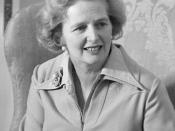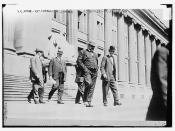Hunger strikes have a long history in Irish culture. The Celts would starve themselves to disgrace someone who wronged them, and the starvation would go on until the situation/situations were made right. It was a way of "self-sacrifice" to the Catholics. If a hunger striker died, the person or people who caused the strike would suffer socially and have to pay costs to that striker's family (http://irelandsown.net/armaghwomen.html). In 1980-81, the offender to the Republican prisoners was the British government under Margaret Thatcher. What all Republican prisoners, male and female, wanted were five demands falling under special status of political Prisoner of War. These demands were: The right to wear their own clothing, the right not to do prison work, to have free association with fellow inmates, a full 50 percent reduction in their sentences, and to have their visits, packages, education, and recreation (inac.org/irishpows/hunger strikers/chapter14.html). Prime Minister Thatcher did not agree to any of these demands, so prisoners began protests leading to a world-famous hunger strike.
The 1980 hunger strike stands out most in recent history because of the seven men who participated in the cause. Those men were Tom McFeeley, Sean McKenna, Leo Green, Tommy McKearney, Raymond McCartney, and John Nixon. It was barely mentioned in the press that three women also took part in the strike in December 1980. These women, particularly Mairead Farrell, wanted the world to see the terrible treatment and conditions of all of the political prisoners.
Mairead Farrell came from a fairly political family in the Falls area of Belfast. She came into her teenage years when the British Army took over the streets of Belfast (relativesforjustice.com/victims/mairead_Farrell.htm). Being under British occupation, she began her political involvement at an early age. She considered herself a victim of the British occupation and felt that she...


